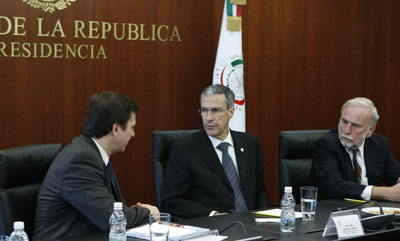With near impunity in the murders of journalists a persistent reason for the terror and self-censorship among Mexican news organizations, legislators say the national Senate is on the verge of passing a constitutional amendment that would allow federal authorities to take over cases of crimes against freedom of expression. Passage would mean that the typically less corrupt and more effective federal police and prosecutors would move aside state authorities to tackle cases of murdered journalists or those living under threat.
Since 2006, more than 40 journalists have died or disappeared in Mexico, according to CPJ research. Due to a mixture of negligence and pervasive corruption among law enforcement officials, particularly at the state level, crimes against the Mexican press are almost entirely unsolved. The failure to investigate abuses has encouraged further crimes, forcing journalists to steer clear of sensitive topics such as violence, corruption and narco-trafficking. The result is that citizens have been stripped of their right to vital information.
The Senate took the first step in adopting the measure on Tuesday, and leaders of the three main political parties told a delegation from CPJ that it would pass a second vote next Tuesday. The bill passed the lower house in November. If it passes the Senate, it would go for ratification to the states, where half plus one would need to pass it. (The CPJ delegation was made up of Carlos Lauría, senior program coordinator for the Americas, María Teresa Ronderos, the renowned Columbian journalist and member of CPJ’s board; Danny O´Brien, CPJ’s internet advocacy coordinator; and me).
“There will be some resistance in some states, but we expect that in about two months half will approve it, “the Senate president, Sen. José González Morfín, told the CPJ delegation. González is head of the National Action Party’s caucus in the Senate. Similar optimism was expressed by Sen. Manlio Fabio Beltrones who leads the Senate caucus for the majority Institutional Revolutionary Party (PRI). That party also controls the governorships in most of Mexico’s states, which, according to diplomats, means the party’s backing would ensure that most state legislatures pass the amendment.
The amendment is a broad one that would allow federal authorities to investigate and punish crimes against journalists or persons or installations when the right of information or the right of expression is affected.
Potential movement on the amendment comes two and a half years after Mexican President Felipe Calderón promised a delegation from CPJ that he would work hard to get the measure through Congress and the states. It had seemed, until recently, that he had failed completely. Most of that time had gone to unsuccessful efforts to push the amendment through the lower house, the Chamber of Deputies, with nothing happening in the Senate. Diplomats and human rights attorneys who followed the lack of progress predicted there was no hope of passage during this legislative session — which for practical purposes finishes the end of next month — and that a whole new effort would be needed with a new legislature, with a new president of Mexico to be elected in July. It’s not clear exactly what changed, but diplomats speculated that Calderón may have pressed the matter for the sake of his reputation.
It’s not over yet, though. The amendment, if passed, would give the federal government the power to take over cases now handled by state authorities, but the details of how it would do that may need further legislation, and before the law can take effect it may be necessary to make changes in the federal procedural and criminal codes.
In addition, the amendment does not in itself reform the existing special federal prosecutor office, which investigates the few crimes against freedom of expression that are already classified as federal offenses. The special prosecutor Laura Borbolla, who replaced Gustavo Salas Chávez in February, is new to the position, but the office she has inherited has never solved a journalist murder case and agents complain of a lack of resources. Borbolla told the CPJ delegation that strengthening her office will be necessary to combat crimes against the press. Funding is supposed to be part of the enabling legislation.
